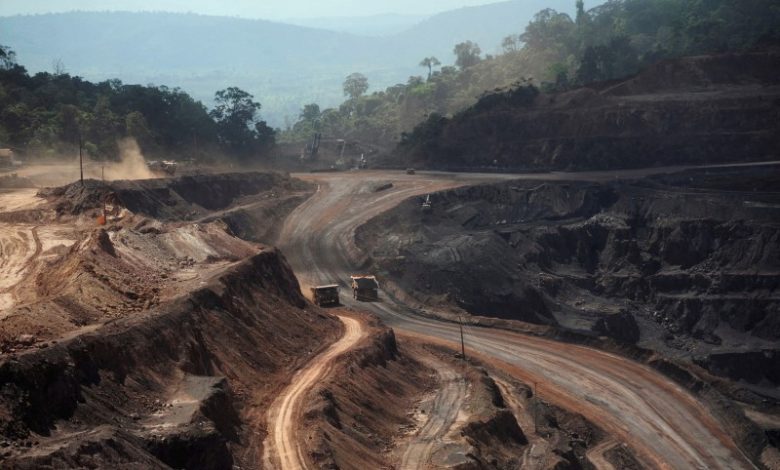
Ghana’s Wildcat Gold Mining Boom: A Threat to People and Nature, Reports Reuters
By Maxwell Akalaare Adombila
PRESTEA-HUNI VALLEY, Ghana – At an unlicensed gold mine in Ghana, workers clad in t-shirts, shorts, and rubber boots wade through muddy pools contaminated with mercury, extracting rocks by hand and maneuvering a makeshift sluice in their quest for gold.
This makeshift operation is part of a rapidly growing sector that, while providing livelihoods and unofficial revenue streams for Ghana’s economy, poses significant health risks to miners, pollutes waterways, destroys forests and cocoa farms, and contributes to criminal activity.
“It’s risky, but I just want to survive,” shared one young man at this unauthorized site in the Prestea-Huni Valley district. The 24-year-old accounting student, who wished to remain anonymous due to his involvement with illegal activities, revealed that he had been skipping classes to prospect for gold, driven by financial necessity after losing his father as a teenager.
Protective gear was conspicuously absent at the site, with workers resorting to makeshift solutions like flimsy plastic bags for head protection, swimming goggles, and rice bags for added coverage.
The unlicensed gold mining sector, locally referred to as “galamsey,” has surged in recent months driven by a nearly 30% spike in global gold prices, attracting more individuals to the trade. Small-scale mines produced 1.2 million ounces of gold in the first seven months of this year—exceeding the totals from the entire previous year, according to Ghana’s mining sector regulator.
Approximately 40% of Ghana’s total gold production originates from small mines, with an estimated 70-80% of these operations being unlicensed.
POISONED PROFITS
Martin Ayisi, who leads Ghana’s Minerals Commission, noted that much of the gold harvested from galamsey operations is smuggled out of the country, contributing little to the national gold export revenue. He expressed optimism about the rise in gold prices, suggesting it would aid in recovery from the country’s severe economic crisis in 2022, which led to a $3-billion bailout from the International Monetary Fund.
“We should be able to get a lot of money and probably exit the IMF programme earlier,” Ayisi stated, predicting that national gold export revenues could more than double to $10 billion this year.
However, experts point out that the lines between legal mining and galamsey are increasingly blurred, with informal mining operations likely generating more revenue than the authorities recognize.
The dangers associated with galamsey activities are stark and undeniable. Recent reports indicate multiple fatalities due to collapsing pits, and health facilities are documenting heightened early mortality rates from respiratory diseases among miners and nearby residents. The cause stems from prolonged exposure to dust laden with heavy metals and toxic fumes produced from gold extraction using mercury and nitric acid.
The disposal of these hazardous chemicals often occurs haphazardly, contaminating the environment. Ghana’s water authority reports that approximately 65% of water sources have been tainted by mercury and heavy metals linked to mining activities. Moreover, illegal mining has decimated thousands of hectares of cocoa farmland and untouched forests.
Public discontent is mounting, with protests erupting in the capital, Accra, where demonstrators have voiced their frustrations toward President Nana Akufo-Addo’s administration regarding its perceived inaction. Slogans like “Leaders, you’ve failed us!” were prominently displayed.
“Galamsey has to stop. We want to live long. We don’t want to get sick. We don’t want to go to the hospital,” declared Aboubacar Sadekh, a participant in a recent march wrapped in the Ghanaian flag.
The government has consistently refuted claims of neglect regarding galamsey. Since taking office in 2017, Akufo-Addo has committed to addressing the issue, launching crackdowns that included deploying soldiers to apprehend illegal miners and destroy mining equipment.
ORGANISED CRIME
Polls indicate that galamsey remains a critical concern for voters leading up to the December 7 elections. The major candidates, Vice President Mahamudu Bawumia and former President John Mahama, have vowed to legitimize galamsey by establishing a state agency that would provide funding and map out areas for local miners.
Despite these promises, successive administrations have struggled to make significant progress due to the influence of powerful stakeholders benefiting from the industry.
Chris Aston, who oversees a British-supported initiative aimed at regulating gold mining in Ghana, highlighted the vulnerability of artisanal miners to organized crime syndicates that offer upfront financing for equipment in exchange for the gold they extract at reduced prices.
Additionally, Emmanuel Kwesi Anning, a security consultant in Accra, pointed out that galamsey activities have led to an increase in gun trafficking, as those involved in illegal mining seek armed protection against thieves and rivals. It is also suggested that some politicians and local leaders are profiting from galamsey undertakings, which perpetuates the cycle of corruption.
“It has become an elite consensus that they’ll not touch this business,” he remarked.
The Minister of Information in Ghana did not respond to requests for comment regarding the alleged involvement of organized crime, gun trafficking, and corruption in the galamsey trade. However, a senior official from the National Security Ministry indicated that efforts are underway to address the connections between illegal mining, money laundering, and gun trafficking.
 GOOGL
GOOGL  META
META 


